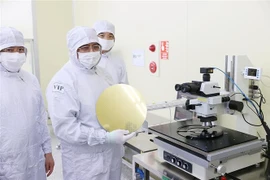 The transformation of traditional industrial parks into sustainable green industrial parks is achieved by promoting green production and efficient use of resources.(Photo baoxaydung.com.vn)
The transformation of traditional industrial parks into sustainable green industrial parks is achieved by promoting green production and efficient use of resources.(Photo baoxaydung.com.vn)Hanoi (VNS/VNA) — Many localities in Vietnamhave promoted converting traditional industrial parks to eco-industrial parksand also developed new green industrial parks.
This is a crucial task of the National Green Growth Strategy2021-2030, vision to 2050, and the National Action Plan for implementingthe 2030 sustainable development agenda.
According to experts, developing a circular economy has become atrend among countries, especially as the world's resources are increasinglydepleted.
For the long term, besides converting existing industrial parks,Vietnam will build new ecological industrial parks meeting the requirements ofdesign and planning and attracting investment projects that haveenvironmentally friendly production processes and technologies, efficient useof resources, waste reduction, and re-use of raw materials and energy.
Vuong Thi Minh Hieu, deputy director of the Department of EconomicZones Management, Ministry of Planning and Investment, said the ministry hascoordinated with the United Nations Industrial Development Organisation (UNIDO)to further replicate the eco-industrial park model in Hai Phong, Dong Nai and HoChi Minh City via the project on deployment of eco-industrial parks in Vietnamaccording to the approach from the Global Eco-Industrial Park Programme. Thateffort has achieved very encouraging results.
However, there are some limitations in developing industrialparks because industrial park development planning has not clearly shown astrategic and overall vision.
In some locations, industrial park development planning does notreflect the actual development needs and ability to attract investment. Thathas led to the quality and efficiency of investment attraction falling short ofexpectations in terms of effectively using land for national socio-economicdevelopment and ensuring sustainable and balanced development of economic,environmental and social pillars.
Besides, the traditional industrial parks in the same localitystill lacked cooperation to increase competitiveness and connection withindustrial parks in neighbouring localities.
Vietnam is attracting more high-quality foreign direct investment(FDI) to promote economic growth and international economic integration.Therefore, preparing industrial infrastructure is an urgent requirement to meetthe increasingly strict requirements of foreign investors.
Of this, the development of eco-industrial parks is consideredvital to solve environmental limitations and inadequacies, reduce resourcewaste, and increase value chain engagement.
Therefore, Vietnam must continue innovating and improving existinginstitutions, policies and regulations and adjusting goals and orientations fordeveloping industrial parks and economic zones. These steps will adapt to thenew context and contribute to implementing the national socio-economicdevelopment strategy./.





























